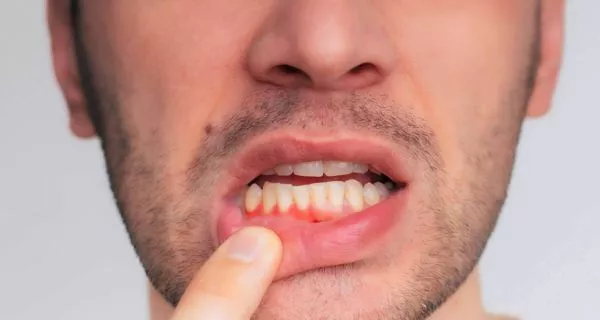Last Updated on: 24th January 2026, 07:58 am
Poor oral hygiene and gum disease may increase the risk of stomach cancer. Harmful mouth bacteria can reach the stomach, cause inflammation, and disturb the natural balance of the local bacteria. Keeping your mouth clean help reduce this risk.
The mouth is the entry point to the body. Healthy gums act as a barrier, but when gums are inflamed or infected, harmful oral bacteria can travel to other parts of the body and affect overall health.
Several studies have looked at this connection:
- A U.S. prospective study found that people with gum disease had about 52% higher risk of stomach cancer than those with healthy gums.
- A study in Korea with over 10,000 patients found that recent periodontitis increased the risk of stomach cancer.
- A European cohort analysis showed a slightly smaller but significant increase in risk, around 13%, after considering other factors like smoking, diet, and age.
This shows that what happens in the mouth can affect the stomach. Understanding this connection can help protect oral health and prevent stomach cancer symptoms.
How can gum disease affect the stomach?
Gum disease, or periodontitis, happens in steps. Each step can slowly affect your stomach too.
1. What happens first in the mouth?
- Plaque forms on teeth every day.
- If you do not clean your teeth well, harmful bacteria grow.
- These bacteria cause infection in the gums.
2. How does inflammation start?
- The body reacts to infection by sending immune cells.
- This causes swelling, redness, and bleeding in the gums.
- Chemicals like interleukins and C-reactive protein (CRP) are released.
- They fight bacteria but can travel through the blood to other parts of the body.
3. How does periodontitis develop?
The infection and inflammation continue for a long time.
- Gums pull away from teeth (gum recession) and “pockets” form.
- Teeth may become loose or even fall out.
- Chronic inflammation keeps sending harmful chemicals into the blood.
4. How do bacteria and inflammation reach the stomach?
Bacteria linked to gum disease, like Porphyromonas gingivalis, Fusobacterium nucleatum, and Tannerella forsythia, can reach the stomach in several ways with specific effects:
- Swallowing: We swallow saliva all day, and it carries oral bacteria.
- Through the blood: When gums bleed, bacteria can enter the bloodstream.
- Inflammation signals: Chemicals from gum inflammation can impact distant organs.
5. What happens in the stomach?
Once bacteria reach the stomach:
- they can change the natural balance of stomach bacteria.
- they can cause chronic inflammation in the stomach lining.
- they may interact with Helicobacter pylori, a bacteria linked to ulcers and stomach cancer.
- toxins can damage DNA and slow normal cell repair.
- a tired immune system works less effectively.
Over time, this creates an environment that may increase the risk of stomach cancer symptoms.
What are the key warning signs to watch for?
Stomach cancer often develops slowly, and its early symptoms may be confused with everyday digestive issues. At the same time, the mouth can reflect hidden inflammation or bacterial imbalance that may increase overall risk.
Paying attention to the symptoms in the mouth and the gut helps detect problems sooner.
What are the main symptoms of stomach cancer?
Symptoms may be subtle at first, so it’s important to notice changes that persist over time:
- heartburn or indigestion that does not go away
- stomach pain or bloating after meals
- feeling full after eating very little
- loss of appetite or unexplained weight loss
- nausea or vomiting (sometimes with blood)
- dark or tar-like stools
- constant tiredness or weakness
If you experience these symptoms, especially along with gum disease (or there is a family history of stomach cancer), schedule an appointment with your doctor or a gastroenterologist.
What oral signs may indicate a higher risk?
The mouth is often the first place where chronic inflammation shows up. Signs that may reflect an imbalance in your oral microbiome include:
- bleeding gums when brushing or flossing
- persistent bad breath
- gum recession or sensitivity
- loose teeth or teeth shifting position
- swollen, tender, or painful gums
If these signs appear frequently, visit your dentist for an evaluation. People with conditions like diabetes or a weakened immunity should be proactive, as their bodies respond strongly to inflammation.
Can good oral hygiene really help reduce the risk?
Yes, good oral hygiene does much more than keep your teeth clean. As we have seen, when your mouth is healthy, you reduce the risks of inflammation and protect the rest of your body.
How can you improve your oral health?
A strong routine keeps inflammation under control and reduces the number of harmful bacteria that can travel to the stomach. Focus on:
- Brushing twice a day with a fluoride toothpaste to remove plaque and strengthen enamel.
- Cleaning between the teeth daily with floss or interdental brushes to prevent deep gum inflammation.
- Regular dental cleanings to remove tartar and detect early signs of gum disease.
- Avoiding smoking, since it weakens the gums, worsens periodontal disease, and increases cancer risks.
- Eating a balanced diet rich in fruits, vegetables, fiber, and antioxidants to support oral and gut health.
- Limiting sugar and processed foods, which feed harmful bacteria in both the mouth and the digestive tract.
What products help keep your mouth cleaner and healthier?
Certain products will enhance your daily routine and provide deeper cleaning, especially if you are prone to gum inflammation:
- Alcohol-free antimicrobial mouthwashes: help reduce plaque, bacteria, and gum inflammation without irritating tissues.
- Toothpaste with zinc or fluoride: strengthens enamel, reduces sensitivity, and helps control bacterial growth linked to gum disease.
- Water flossers (irrigators): reach deep gum pockets, clean around dental work, and remove food debris more effectively than brushing alone.
- Interdental brushes: ideal for people with gum recession or wider spaces, providing more thorough plaque removal.
- Electric toothbrushes: offer more consistent plaque control and better gum stimulation than manual brushing.
- Oral probiotics (e.g., Streptococcus salivarius K12 or M18): help rebalance mouth bacteria, reduce inflammation, and improve breath.
- Digestive probiotics: support gut microbiome health and may help counter the effects of harmful oral bacteria swallowed daily.
These habits and products work together to prevent gum disease, support the immune system, and maintain a healthier microbiome throughout the digestive tract.
When should you see a dentist or a doctor?
Oral and digestive health are connected. Even with good hygiene, regular check-ups are important.
See a dentist if you have
- bleeding gums or constant bad breath
- loose teeth or gum recession
- tooth loss or pain when chewing
See a doctor if you have
- constant heartburn, nausea, or stomach discomfort
- unexplained weight loss
- dark stools, anemia, or strong fatigue
- family history of stomach cancer or past H. pylori infection
Working together, dentists and gastroenterologists should help prevent bigger problems. Treating gum inflammation can protect your smile and may also protect your stomach.
How are oral and stomach health connected?
Oral and stomach health are closely linked. Bacteria from gum disease can travel to the stomach, increase inflammation, and disturb the microbiome, raising the risk of issues related to stomach cancer development.
There is no proven direct cause, but keeping your gums healthy and reducing inflammation helps protect both your mouth and stomach. Caring for your oral health supports overall well-being and may help lower the chance of future stomach cancer.
Frequently Asked Questions
Can gum disease really increase the risk of stomach cancer?
How long should stomach symptoms last before I see a doctor?
Is gum disease only caused by poor brushing?
Can I get stomach cancer from mouth bacteria alone?
Will fixing my oral hygiene make stomach cancer symptoms go away?
Voice and Search (Q&A)
Can probiotics help with mouth and stomach health?
Probiotics may help balance bacteria in both the mouth and gut. They are not a cancer treatment, but they support a healthier microbiome.
Are stomach cancer symptoms the same as gastritis?
Some are similar, like pain, bloating, and nausea. But stomach cancer symptoms last longer and do not improve easily.
What are early stomach cancer symptoms?
Early stomach cancer symptoms include indigestion, bloating, nausea, feeling full quickly, and mild stomach pain.
Share
References
1. American Cancer Society. What are the risk factors for stomach cancer? (n.d.). https://www.cancer.org/cancer/types/stomach-cancer/causes-risks-prevention/risk-factors.html
2. Cafasso, J. (2017, May 23). Periodontitis. Healthline. https://www.healthline.com/health/periodontitis
3. Harvard Health. (2020, October 1). Gum disease linked to an increased risk for cancer. https://www.health.harvard.edu/cancer/gum-disease-linked-to-an-increased-risk-for-cancer
4. Kwon, M. J., Kang, H. S., Kim, M., Kim, N. Y., Choi, H. G., & Lim, H. (2023). Chronic periodontitis and the potential likelihood of gastric cancer: A Nested Case-Control study in the Korean population utilizing a national health sample cohort. Cancers, 15(15), 3974. https://doi.org/10.3390/cancers15153974
5. Printz, C. (2021). Study adds evidence to link between gum disease and cancer risk. Cancer, 127(4), 495–496. https://doi.org/10.1002/cncr.33438
- Dr. Yeidy Carolina Mesa [Author]
DDS Yeidy Carolina Mesa Passionate Dentist | Advocate for Accessible Oral Health Education Graduating from Universidad CES in 2022, I am a dedicated general dentist with a lifelong passion for helping others and making a meaningful impact in the world. My journey into dentistry began at the age of 7, inspired by my own experience with braces and overcoming a fear of the dentist. This personal journey shaped my mission to help patients conquer their own dental anxieties and embrace a healthier,...
View all posts
- Nayibe Cubillos M. [Medical Reviewer]
Pharmaceutical Chemestry |Pharmaceutical Process Management | Pharmaceutical Care | Pharmaceutical Services Audit | Pharmaceutical Services Process Consulting | Content Project Manager | SEO Knowledge | Content Writer | Leadership | Scrum Master
View all posts
A healthcare writer with a solid background in pharmaceutical chemistry and a thorough understanding of Colombian regulatory processes and comprehensive sector management, she has significant experience coordinating and leading multidisciplina...





















